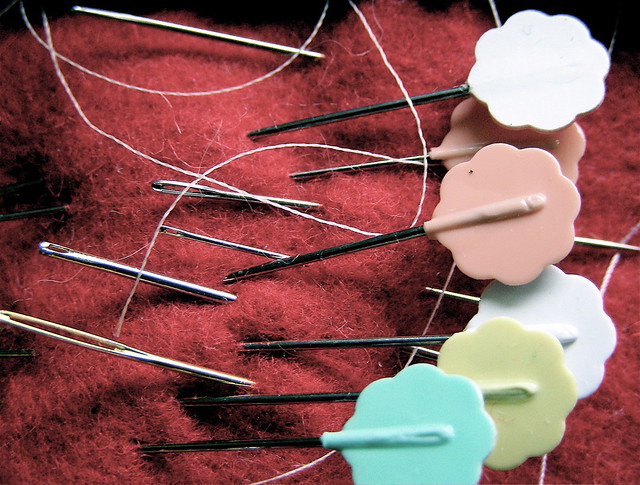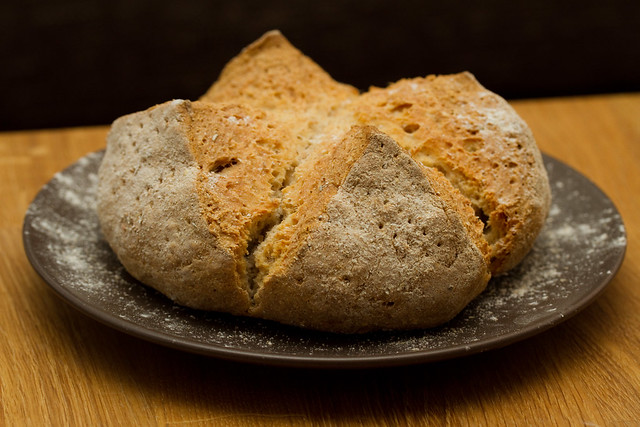Words for pin, needle and related things in Celtic languages.
Words marked with a * are reconstructions.
| Proto-Celtic | *delgos = pin, needle |
|---|---|
| Gaulish | *dalgis = scythe |
| Old Irish (Goídelc) | delg [dʲerɡ] = thorn, pin, brooch, peg |
| Middle Irish (Gaoidhealg) | delg = thorn, pin, brooch, peg, spike, nail, pointed implement delga, delgu = pin, peg, spike, tip, point delgach = pointed |
| Irish (Gaeilge) | dealg [ˈdʲal̪ˠəɡ / ˈdʲalˠəɡ] = thorn, prickle, spine, spike, pin, peg, pointed implement, brooch dealgán = knitting-needle deilgne = thorns, prickles deilgneach = thorny, prickly, barbed |
| Scottish Gaelic (Gàidhlig) | dealg [dʲal̪ˠag] = pin, skewer, knitting needle, prick(le) dealg-fighidh = knitting needle dealgan = spindle, small pin, skewer dealg brodaidh = cattle prod dealgach [dʲal̪ˠagəx] = prickly, stinging dealganach [dʲal̪ˠaganəx] = pertaining to or abounding in spindles, small pins or skewers |
| Manx (Gaelg) | jialg = broochpin, needle, prick(le), quill, spine, thorn, pin jialg broghil = brooch jialg fuilt = hairpin jialg oashyr = knitting needle jialgagh = prickly, spiniferous, spiny, thorny jialgaghey = to pin, prickle, pinning |
| Middle Welsh (Kymraec) | dala = sting |
| Welsh (Cymraeg) | dala [ˈdala] = sting, bite |
| Old Cornish (Cernewec) | delc(h) = jewel, necklace |
| Middle Cornish (Cernewec) | delc = necklace |
| Cornish (Kernewek) | delk = necklace |
Etymology from Proto-Indo-European *dʰelg- (sting). Words from the same root include dálkur (spine of a fish, knife, dagger, [newspaper] column) in Icelandic, dilgus (prickly) in Lithuanian, falce (scythe, sickle) in Italian, hoz (sickle) in Spanish, and falcate (shaped like a sickle), falcifer (sickle-bearing, holding a scythe) in English [source].
Words from the same Proto-Celtic root, via Gaulish *dalgis (scythe) and Latin *daculum (scythe) , possibly include dall (mowing, billhook) in Catalan, dalle (scythe) in Spanish, and dalha (scythe) in Occitan (Languedoc) [source].
The English word dagger, and related words in other languages, such as daga (dagger) in Spanish, and Degen (rapier, épée) in German, might come from the same roots [source].
| Proto-Celtic | *ber = (cooking) spin |
|---|---|
| Old Irish (Goídelc) | bi(u)r [bʲir] = stake, spit, point, spear, spike berach = pointed, sharp |
| Middle Irish (Gaoidhealg) | bir = stake, spit, point, spear, spike biraid = to pierce biraigthe = sharpened, pointed birda = pointed, sharp birín = little spike, sharp point, dart, little spear |
| Irish (Gaeilge) | bior [ˈbʲɨ̞ɾˠ] = pointed rod or shaft, spit, spike, point biorach = pointed, sharp bioraigh = to point, sharpen biorán = pin, hand (of clock) bioranta = sharp biorú = pointing, sharpening |
| Scottish Gaelic (Gàidhlig) | bior [bir] = prickle, thorn, point, pointed object, knitting needle biorachadh [birəxəɣ] = sharpening, making pointed, staring biorag [birag] = small thorn or prickle, spiteful sharp-tongued woman biorach [birəx] = pointed, sharp, piercing, prickly bioraich [birɪç] = sharpen, make pointed, stare |
| Manx (Gaelg) | birr, byr = point, spit birragh, byrragh = pointed, scathing, sharp, spiky, tapered, prickly birranagh = pointed, sharp birraghey = to sharpen, taper, tone up |
| Proto-Brythonic | ber = (cooking) spit |
| Middle Welsh (Kymraec) | bêr, ber = spear, lance, pike, spit, skewer beraid = as much as can be held on a spit |
| Welsh (Cymraeg) | bêr [beːr] = spear, lance, pike, spit, skewer ber(i)af, berio, beru = to spit (meat), impale, stab with a spear beriad = as much as can be held on a spit bergi = turnspit (dog) bernod = dagger, obelisk |
| Middle Cornish (Cernewec) | ber, bêr = spit, lance, spear |
| Cornish (Kernewek) | berya = to stab, run through |
| Middle Breton (Brezonec) | ber, bèr, bir = (roasting) spit |
| Breton (Brezhoneg) | ber [beːr] = spindle, point, spike beriad = pin berian = skewer |
Etymology from Proto-Indo-European *gʷéru (spit, spear) [source]. Words from the same PIE root include verrocchio (olive oil press) in Italian, verrou (bolt, lock) in French, cerrojo (bolt, latch) in Spanish [source].
| Proto-Celtic | *snātantā = needle (?) *snātos = thread |
|---|---|
| Old Irish (Goídelc) | snáthat = needle snáith = thread |
| Middle Irish (Gaoidhealg) | snáthat, snāthad, snathat = needle snáithe = thread |
| Irish (Gaeilge) | snáthaid [ˈsˠn̪ˠɑːhəd̪ˠ] = needle, snáthadóir = needle-maker snáth = thread, yarn, web |
| Scottish Gaelic (Gàidhlig) | snàthad [sn̪ˠaː.əd] = needle, pointer (on a dial) snàthadair [sn̪ˠaː.ədɪrʲ] = needle-maker snàthadalan [sn̪ˠaː.ədəl̪ˠan] = needlecase snàthadh [sn̪ˠaː.əɣ] = threading, stringing snàthadag [sn̪ˠaː.ədag] = sting snàth [sn̪ˠaː] = thread, yarn |
| Manx (Gaelg) | snaid = needle, pointer, indicator, index snaid whaaley = sewing needle snaidagh = needle-like snaidey = knit obbyr snaidey = needlework snaih, snaie = line, thread, yarn, worm, netting |
| Old Welsh (Kymraec) | notuid = needle, pin |
| Middle Welsh (Kymraec) | notwyd, nottwyd, nodwydd = needle, pin |
| Welsh (Cymraeg) | nodwydd [ˈnɔdwɨ̞ð/ˈnɔdʊi̯ð] = needle, pin, pointer, dial nodwyddaf, nodwyddo = to sew, stitch, inject, prick nodwyddiad = acupuncture nodwyddig = small needle nodwyddwaith = needlework nodwyddwr = needlemaker, pinmaker, sewer, stitcher, tailor |
| Middle Cornish (Cernewec) | nadedh, nadzhedh = needle noden = thread, yarn |
| Cornish (Kernewek) | naswydh, najedh = needle neusen, neujen = thread, yarn neusenna = to thread |
| Middle Breton (Brezonec) | nadoez, nados, nadoz = sewing needle neut, neud = thread |
| Breton (Brezhoneg) | nadoez [beːr] = needle, hand, pointer, spire nadoezenn = (clock) hand nadoezier = needle maker neud = thread, filaments, net, algae |
Etymology from Proto-Indo-European *(s)neh₁- (to spin, sew) [source]. Words from the same PIE root include needle, nerve, neuron, sinew and snood in English [source].
Sources: Wiktionary, Am Faclair Beag, Online Manx Dictionary, Teanglann.ie, eDIL – Electronic Dictionary of the Irish Language, In Dúil Bélrai English – Old Irish glossary, Geiriadur Prifysgol Cymru, Gerlyver Kernewek, Dictionaire Favereau, TermOfis, English – ProtoCeltic WordList (PDF), Etymological Dictionary Of Proto Celtic












